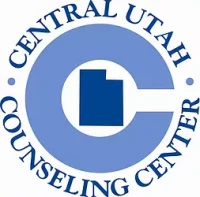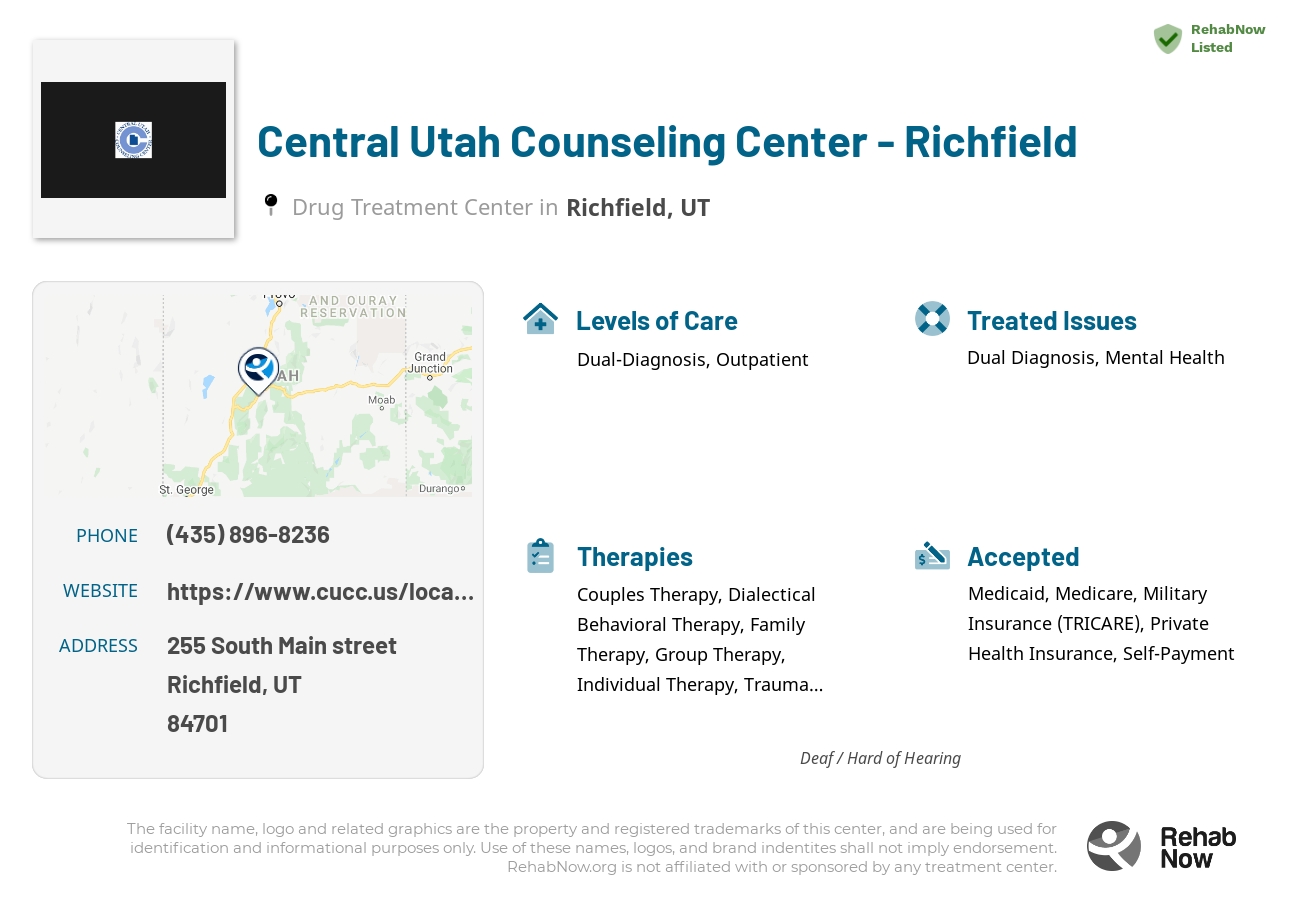Central Utah Counseling Center - Richfield
Drug Rehab Center in Richfield, Utah
Central Utah Counseling Center - Richfield offers individualized treatments for substance abuse and addiction, with assistance on a range of services including dual-diagnosis, outpatient and private health insurance, helping individuals achieve sustained sobriety.
About Central Utah Counseling Center - Richfield in Utah
Central Utah Counseling Center - Richfield is an addiction treatment facility located in Richfield, Utah. This center specializes in providing comprehensive care for individuals who are suffering from addiction and substance abuse. They also offer services for those with dual diagnosis, mental health disorders, alcoholism, and drug addiction. Central Utah Counseling Center - Richfield is committed to helping individuals regain control of their lives and achieve sobriety. They offer a range of treatment options, including outpatient levels of care, to ensure that each individual receives personalized and focused care. The center accepts private health insurance, making it accessible to those seeking help from different backgrounds. With their affiliation to Central Utah Counseling Center, patients can trust that they will receive high-quality and evidence-based treatment.
At Central Utah Counseling Center - Richfield, a variety of services and treatment methods are provided to address addiction and substance abuse. Their dedicated team of professionals offers dual-diagnosis treatment, which is crucial for individuals with co-occurring mental health disorders alongside their addiction. This integrated approach ensures that both the addiction and the underlying mental health issues are addressed simultaneously. The center also offers outpatient levels of care, allowing individuals to receive treatment while still maintaining their daily responsibilities and routines. The treatment methods employed at Central Utah Counseling Center - Richfield are evidence-based and tailored to meet the specific needs of each patient. Through therapy, counseling, group support, and other techniques, individuals are empowered to overcome addiction and achieve long-lasting recovery. The center's affiliation with Central Utah Counseling Center further enhances their ability to provide comprehensive care and access to additional resources for continued support.
Genders
Ages
Modality
Additional
Conditions and Issues Treated
Substance abuse creates problems that affect people in Richfield, UT on many levels. First, substance abuse affects the individual who is abusing drugs or alcohol. This can result in health problems, including heart damage and overdose. Substance abuse also affects the user’s family, friends, co-workers, classmates, or peers. These people feel frustrated because they do not know how to help their loved ones struggling with addiction. At the same time, the addict cannot control his behavior. Lastly, friends and family members of addicts are affected financially by substance abuse.
The good news is that effective treatments can help prevent substance abuse or treat its effects on the user. These treatments, which include behavioral therapy and counseling sessions, target the underlying causes of substance abuse, helping users achieve sobriety so they can regain control over their lives. They also teach users to cope with stress in ways other than using drugs or alcohol.
A “dual diagnosis” is when the individual has two medical issues at the same time. The top co-occurring mental disorders with addiction are depression, anxiety, ADHD, bi-polar disorder. Addiction is also considered a mental illness that is not a choice but rather a medical condition. Addiction can be caused by any number of underlying issues.
Dual diagnosis is provided by Central Utah Counseling Center - Richfield to treat addictive tendencies as well as any untreated mental illnesses. This ensures successful long term health and recovery for patients after treatment has been completed.
Dual diagnosis is provided by Central Utah Counseling Center - Richfield to treat addictive tendencies as well as any untreated mental illnesses for people in Utah. This ensures successful long term health and recovery for patients after treatment has been completed.Levels of Care Offered
This center offers a variety of custom treatment tailored to individual recovery. Currently available are Dual-Diagnosis, Outpatient, with additional therapies available as listed below.
Outpatient programs at Central Utah Counseling Center - Richfield, the Richfield resident can live with their family while continuing with their job or studies. Treatment includes educating the patient on drug abuse, medications, and counseling sessions at the individual or group level. Outpatient treatment plans cover diagnosis, detoxification, management, and counseling. They are a popular option for those who have graduated from inpatient facilities.
Therapies & Programs
Individual therapy is a form of counseling where you meet with a trained professional one-on-one. Meeting with a therapist in this setting allows for a personal and trusting relationship to be built. This allows the patient to open up about sensitive or private issues they may not feel comfortable discussing in a group. Individual therapy helps identify the root causes of your addiction, which can help prevent relapse.
Couples therapy for drug addiction is a unique form of therapy that allows family members to work through the emotional issues of their loved one’s addiction together. Family members can support each other while learning how to cope with the addiction and encourage healthy changes. The two will work with a therapist to learn how the addiction affects themselves and the relationship.
Family therapy is often done alongside drug treatment to help addicts stay sober. The goal of family therapy for drug addiction is to create an environment where communication can happen without judgment, hostility, or blame. The therapist will sit with the family so they can learn how to communicate differently and provide new tools for dealing with emotions so that people don’t want to drink or do drugs. It’s important for families to focus on relapse prevention plans during treatment so that if the addict feels like they want to use again, they’ll know what steps they need to take together to prevent it from happening again in the future.
Group therapy sessions are another common addiction recovery service. These group sessions typically involve six to 12 addicts who meet regularly with a trained professional for support and guidance.
During these sessions, the group shares their experiences with one another and provides feedback that can help each member avoid relapse or overcome specific obstacles they are facing in their recovery process. With this type of support and guidance, addicts can feel like they are part of a community that understands their struggles and will help them get through the hard times.
Many people struggling with drug addiction have experienced some form of trauma in their lives. It is crucial that these individuals seek out professional help; otherwise, their drug abuse and addiction will likely continue.
Therapists and counselors at drug treatment centers employ several treatment programs to help people struggling with drug addiction, including trauma therapy. Trauma therapy helps people dealing with addiction by allowing them to confront the traumas of their past and move past them.
It is important to note that trauma therapy should not be confused with PTSD (post-traumatic stress disorder). Rather, it is used to treat the effects of trauma, which are often at the root of addiction.
Dialectical Behavior Therapy was developed in the 1980s to treat chronically suicidal individuals. It is a cognitive-behavioral therapy that combines standard DBT with strategies derived from Zen Buddhism, such as mindfulness training.
DBT has been adapted for use with other types of psychiatric problems, including eating disorders, substance abuse disorders, borderline personality disorder, posttraumatic stress disorder (PTSD), and other personality disorders. Dialectical Behavior Therapy is considered a psychosocial treatment of BPD. This means that while it can be used alone or in conjunction with drug treatments, DBT does not rely on medications to treat the disorder. Instead, DBT aims to help patients change their thinking and behavior.
Cognitive Behavioral Therapy (CBT) focuses on the underlying thoughts and behaviors that caused the problem of addiction in the first place and may cause a relapse. Negative feelings are common in drug abuse disorders, but they can lead to co-occurring disorders if not recognized. CBT involves strategies that help to change the behavior pattern by restructuring negative thoughts into positive ones. It helps to remove these feelings, and it provides long-term benefits. Also, CBT promotes self-awareness and self-control. It can be administered as a monotherapy or as part of combination therapy.
CBT can improve the patient’s mood, reduce drug cravings and boost success rates on treatment plans. Regular practice can help individuals handle negative attitudes, thoughts, and feelings without turning to drugs or alcohol. The core belief of Cognitive Behavioral Therapy (CBT) is that one’s moods, behaviors, and actions are all connected. Individuals can improve their quality of life using CBT. It helps addicts understand the patterns of thought and feelings that cause them to use drugs or alcohol and develop a healthy response.
Payment Options Accepted
For specific insurance or payment methods please contact us.
Is your insurance accepted?
Ask an expert, call (888) 674-0062
Central Utah Counseling Center Associated Centers
Discover treatment facilities under the same provider.
- Central Utah Mental Health Center - Nephi in Nephi, UT
- Central Utah Counseling Center - North Ephraim in Ephraim, UT
- Central Utah Counseling Center - Fillmore in Fillmore, UT
Learn More About Central Utah Counseling Center Centers
Additional Details
Specifics, location, and helpful extra information.
Richfield, Utah 84701 Phone Number(435) 896-8236 Meta DetailsUpdated November 25, 2023
Staff Verified
Central Utah Counseling Center - Richfield Patient Reviews
There are no reviews yet. Be the first one to write one.
Richfield, Utah Addiction Information
More than 500 people in Utah die each year from the effects of drug abuse and/or addiction. Substance abuse rates in Utah have seen an upward trend for a variety of drugs. Opioids are involved in almost 70% of all drug-related deaths in the state, annually. In 2014, Utah officials created a Good Samaritan Law to protect drug users who report possible overdoses from being prosecuted themselves.
Treatment in Nearby Cities
- Kanab, UT (121.2 mi.)
- Paradise, UT (194.4 mi.)
- Logan, UT (206.0 mi.)
- North Salt Lake, UT (144.5 mi.)
- Grand Junction, UT (192.8 mi.)
Centers near Central Utah Counseling Center - Richfield
The facility name, logo and brand are the property and registered trademarks of Central Utah Counseling Center - Richfield, and are being used for identification and informational purposes only. Use of these names, logos and brands shall not imply endorsement. RehabNow.org is not affiliated with or sponsored by Central Utah Counseling Center - Richfield.


